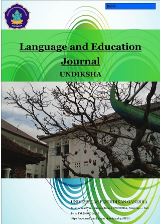THE IMPLEMENTATION OF TECHNOLOGY-BASED PROJECT-BASED LEARNING MODEL IN TEACHING ENGLISH AT UNIVERSITY LEVEL: A NEED ANALYSIS
Analisis Kebutuhan dalam Penerapan Pembelajaran Berbasis Proyek Berbasis Teknologi untuk Mengajar Bahasa Inggris di Tingkat Universitas
Keywords:
english skill, project-based learning, technology, 21-st century skillsAbstract
This research is needs research regarding the use of project-based learning. The purpose of this study is to compare the current situation and the expected situation regarding the use of Technology-Based Project-Based Learning at Monarch Singaraja. This study used an explanatory mix-method design where the mixed methods design was carried out by first analyzing the data quantitatively and then explaining it with qualitative methods. The quantitative method used is the questionnaire method which was given to ten English teaching lecturers at Monarch Singaraja. Qualitative analysis methods using interviews and document analysis. The document analysis method used is to analyze the syllabus, lesson plans, and learning sessions provided by the campus. The needs analysis method used is a combination research method between the CIPP model and the OEM model so that gaps can be found. In this study, it was found that the conceptual framework for using project-based learning had not been found. Another finding was that lecturers were pedagogically ready to carry out project-based learning, but were not ready in the form of paper or learning guides. The existence of a conceptual framework is very important to provide a foundation for lecturers in carrying out learning in the future so that learning can be carried out properly on this campus. Likewise, the readiness of lecturers and students in learning is needed so that this technology-based project-based learning can run optimally
References
Anwas, E. O. M., Sugiarti, Y., Permatasari, A. D., Warsihna, J., Anas, Z., Alhapip, L., Siswanto, H. W., & Rivalina, R. (2020). Social media usage for enhancing english language skill. International Journal of Interactive Mobile Technologies, 14(7), 41–57. https://doi.org/10.3991/IJIM.V14I07.11552
Dorr, M. (2017). the Effectiveness of Project-Based Learning Using Digital Storytelling Technology on Improving Second-Grade Students’ Performance of Science Standards. Electronic Theses and Dissertations, 37(No. 1/2), 1–27. https://ci.nii.ac.jp/naid/40021243259/
Eliyasni, R., Kenedi, A. K., & Sayer, I. M. (2019). Blended Learning and Project Based Learning: The Method to Improve Students’ Higher Order Thinking Skill (HOTS). Jurnal Iqra’ : Kajian Ilmu Pendidikan, 4(2), 231–248. https://doi.org/10.25217/ji.v4i2.549
Erdoğan, V. (2019). Integrating 4C Skills of 21st Century into 4 Language Skills in EFL Classes. International Journal of Education and Research, 7(11), 113–124. http://www.ijern.com/
Giguere, D., Dickson, D. J., Tulloch, M. K., & Hoff, E. (2022). Majority language skill, not measures of bilingualism, predicts executive attention in bilingual children. Journal of Experimental Child Psychology, 213, 105256. https://doi.org/10.1016/j.jecp.2021.105256
Gupta, K., Sleezer, C. M., & Russ-Eft, D. F. (2007). A Practical Guide to Needs Assessment. Pfeiffer.
McCrudden, M. T., & McTigue, E. M. (2019). Implementing Integration in an Explanatory Sequential Mixed Methods Study of Belief Bias About Climate Change With High School Students. Journal of Mixed Methods Research, 13(3), 381–400. https://doi.org/10.1177/1558689818762576
Mellati, M., & Khademi, M. (2018). Technology-Based Education. December, 48–62. https://doi.org/10.4018/978-1-5225-7010-3.ch003
Shin, M.-H. (2018). Effects of Project-based Learning on Students’ Motivation and Self-efficacy. English Teaching, 73(1), 95–114. https://doi.org/10.15858/engtea.73.1.201803.95
Siregar, M. (2021). Needs Analysis of Project Based Learning Learning Model Development in Translation as Profession Course. … Research and Critics in Linguistics and Education …, 4, 1288–1299. https://doi.org/https://doi.org/10.33258/birle.v4i4.2877
Sleezer, C. M., Russ-Eft, D. F., & Gupta, K. (2014). A Practical Guide to Needs Assessment. In Practical guide to dairying /. https://doi.org/10.5962/bhl.title.102958
Widana, I. N. S., & Parmithi, N. N. (2022). Resetting Pembelajaran Berbasis Proyek pada Implementasi Merdeka Belajar Kampus Merdeka. … Nasional Biologi Dan Pendidikan …, 76–88. https://doi.org/10.5281/zenodo.7122412
Yu, Z., & Dong, Y. (2022). The Emergence of a Complex Language Skill: Evidence from the Self-organization of Interpreting Competence in Interpreting Students. Bilingualism, 25(2), 269–282. https://doi.org/10.1017/S1366728921000870
Yustina, Syafii, W., & Vebrianto, R. (2020). The effects of blended learning and project-based learning on pre-service biology teachers’ creative thinking skills through online learning in the COVID-19 pandemic. Jurnal Pendidikan IPA Indonesia, 9(3), 408–420. https://doi.org/10.15294/jpii.v9i3.24706
Downloads
Published
How to Cite
Issue
Section
License
Copyright (c) 2023 Kadek Agus Mahardika Yasa, Ni Nyoman Padmadewi, Kadek Sintya Dewi

This work is licensed under a Creative Commons Attribution-ShareAlike 4.0 International License.










